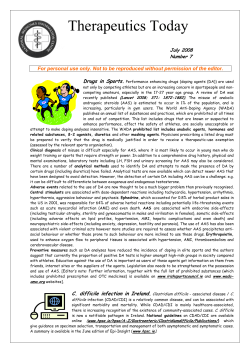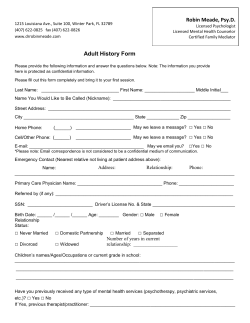
SAMPLE Children's Depression Inventory 2nd Edition: Self-Report Assessment Report Maria Kovacs, Ph.D.
Children's Depression Inventory 2nd Edition: Self-Report Maria Kovacs, Ph.D. E L P Assessment Report M A S This Assessment Report is intended for use by qualified assessors only, and is not to be shown or presented to the respondent or any other unqualified individuals. Copyright © 2011 Maria Kovacs, Ph.D. and Multi-Health Systems Inc. All rights reserved. P.O. Box 950, North Tonawanda, NY 14120-0950 3770 Victoria Park Ave., Toronto, ON M2H 3M6 ver. 1.0 CDI 2:SR Assessment Report for Trisha Lang Admin Date: 05/15/2010 Introduction The Children’s Depression Inventory 2nd Edition™: Self-Report (CDI 2:SR) assesses the presence and severity of depressive symptoms in children aged 7–17 years. When used in combination with other information, results from the CDI 2:SR can help to better understand a child and guide intervention decisions. This report provides information about the child’s score, how she compares with other children of a similar age, and which (if any) scale scores are elevated. Please see the CDI 2 Technical Manual (published by MHS) for additional interpretive information. This report is an interpretive aid and should not be provided to parents, teachers, or children or used as the sole basis for clinical diagnosis or intervention. Administrators are cautioned against drawing unsupported interpretations. To obtain a comprehensive view of the child, information from this report should be combined with information gathered from other psychometric tests, interviews, observations, and available records. This report is based on an algorithm that produces the most common interpretations of the scores that have been obtained. Administrators should review the child’s responses to specific items to ensure that these interpretations apply. E L P Graphical Display of T-scores The following graph displays T-scores for each of the CDI 2:SR scales for Trisha Lang. M A S Copyright © 2011 Maria Kovacs, Ph.D. and Multi-Health Systems Inc. All rights reserved. Page 2 ver. 1.0 CDI 2:SR Assessment Report for Trisha Lang Admin Date: 05/15/2010 Comprehensive Table of Scores The following table summarizes the results of Trisha Lang’s assessment of herself and provides general information about how she compares with the normative group. Please refer to the CDI 2 Technical Manual for more information about interpreting these results. Scale Raw Score TOTAL SCORE 30 EMOTIONAL PROBLEMS 16 Negative Mood/Physical Symptoms 9 Negative Self-Esteem 7 FUNCTIONAL PROBLEMS 14 Ineffectiveness Interpersonal Problems T-score Percentile Classification Interpretive Guideline (90% CI) The child may be experiencing an elevated number of depressive symptoms. 90 99 Very Elevated Further analysis of the scale and subscale (83-97) scores will identify which components of depression are most problematic. The child may be experiencing negative mood, physical symptoms, and negative 90 99 Very Elevated self-esteem. Further analysis of the (81-99) subscale scores will identify which kinds of emotional problems are most evident. The child may have depressive symptoms 83 that manifest as sadness or irritability, as 99 Very Elevated (72-94) well as physical symptoms related to sleep, appetite, fatigue, and aches/pains. 90 The child may have low self-esteem, 98 Very Elevated (81-99) self-dislike, and feelings of being unloved. The child may be experiencing issues with ineffectiveness and interpersonal 89 99 Very Elevated problems. Further analysis of the subscale (79-99) scores will identify which kinds of functional problems are most evident. The child may be evaluating her abilities and school performance negatively, and 77 97 Very Elevated (64-90) may be experiencing an impaired capacity to enjoy school and other activities. The child may have problems interacting 90 99 Very Elevated with peers and may feel lonely and (79-101) unimportant to her own family. E L P M A S 8 6 Note(s): CI = Confidence Interval. Critical Item Trisha Lang endorsed the item “I think about killing myself but would not do it.” Immediate follow-up is strongly recommended. Copyright © 2011 Maria Kovacs, Ph.D. and Multi-Health Systems Inc. All rights reserved. Page 3 ver. 1.0 CDI 2:SR Assessment Report for Trisha Lang Admin Date: 05/15/2010 Text Summary of Scores for Trisha Lang The following section summarizes in a textual format the CDI 2:SR scores. The scores being reported here include the T-score, 90% Confidence Interval (CI), and Percentile Rank. Higher scores and higher percentile ranks indicate greater problems. The Total Score reflects the number and overall severity of depressive symptoms. Ratings on this scale yielded a T-score of 90 (90% CI = 83-97), which is ranked at the 99th percentile, and falls within the Very Elevated score range. The Emotional Problems scale score reflects the child’s negative mood, physical symptoms, and negative self-esteem. Ratings on this scale yielded a T-score of 90 (90% CI = 81-99), which is ranked at the 99th percentile, and falls within the Very Elevated score range. Note: The child endorsed the item “I think about killing myself but would not do it.” Immediate follow-up is strongly recommended. E L P The Negative Mood/Physical Symptoms subscale score reflects feelings of sadness, irritability and physical symptoms related to sleep, appetite, fatigue, and aches and pains. Ratings on this subscale yielded a T-score of 83 (90% CI = 72-94), which is ranked at the 99th percentile, and falls within the Very Elevated score range. The Negative Self-Esteem subscale score reflects feelings of low self-esteem, self-dislike, and feelings of being unloved. Ratings on this subscale yielded a T-score of 90 (90% CI = 81-99), which is ranked at the 98th percentile, and falls within the Very Elevated score range. M A The Functional Problems scale score reflects issues with ineffectiveness and interpersonal problems. Ratings on this scale yielded a T-score of 89 (90% CI = 79-99), which is ranked at the 99th percentile, and falls within the Very Elevated score range. The Ineffectiveness subscale score reflects negative evaluation of one’s abilities and academic performance, as well as an impaired capacity to enjoy school and other activities. Ratings on this subscale yielded a T-score of 77 (90% CI = 64-90), which is ranked at the 97th percentile, and falls within the Very Elevated score range. S The Interpersonal Problems subscale score reflects the child’s difficulty interacting with peers. The ratings also indicate feelings of loneliness and unimportance to one’s family. Ratings on this subscale yielded a Tscore of 90 (90% CI = 79-101), which is ranked at the 99th percentile, and falls within the Very Elevated score range. Copyright © 2011 Maria Kovacs, Ph.D. and Multi-Health Systems Inc. All rights reserved. Page 4 ver. 1.0 CDI 2:SR Assessment Report for Trisha Lang Admin Date: 05/15/2010 Item Responses Trisha Lang provided the following ratings for items on the CDI 2:SR. Item 1. 2. 3. 4. 5. 6. 7. 8. 9. 10. 11. 12. 13. 14. 15. 16. 17. 18. 19. 20. 21. 22. 23. 24. 25. 26. 27. 28. Rating 1 2 1 0 0 0 0 1 2 1 1 1 1 1 1 2 2 2 2 2 2 2 0 1 1 1 1 1 Response Key: 0 = First response is checked 1 = Second response is checked 2 = Third response is checked ? = Omitted item E L P M A S Copyright © 2011 Maria Kovacs, Ph.D. and Multi-Health Systems Inc. All rights reserved. Page 5 ver. 1.0 CDI 2:SR Assessment Report for Trisha Lang Admin Date: 05/15/2010 Children’s Depression Inventory 2nd Edition Feedback Handout of Self-Report Ratings Child’s Name/ID: Trisha Lang Child’s Age: 8 years Date of Assessment: May 15, 2010 Assessor’s Name: Dr. K This feedback handout explains scores from ratings of this child’s depressive symptoms as assessed by the Children’s Depression Inventory 2nd Edition: Self-Report (CDI 2:SR). This section of the report may be given to parents (caregivers) or to a third party upon parental consent. E L P What is the CDI 2:SR? The CDI 2:SR is a rating scale that is used to gather information about the presence and severity of depressive symptoms in children. The CDI 2:SR was developed by Dr. Maria Kovacs, an expert in child and adolescent depression. Research has shown that the CDI 2:SR is reliable and valid, which means that you can trust the scores from the assessment. Why do children complete the CDI 2:SR? Information from the child about his or her own behavior and feelings is extremely important. A self-report provides invaluable information about the child’s perceptions, feelings, and attitudes about him- or herself of which parents and teachers may not be aware. The most common reason for using the CDI 2:SR is to better understand a child who may be having emotional or functional difficulties and to determine if help is needed. The CDI 2:SR also can be used to evaluate if a treatment service is helping the child to feel and function better. Sometimes the CDI 2:SR is used for a routine check, even if there is no reason to suspect the child is having a problem. M A How does the CDI 2:SR work? Trisha Lang has read the 28 items of the CDI 2:SR and responded by indicating which statements best described her during the past two weeks. Trisha Lang’s responses were combined into groups of items. Each group of items describes a certain component of depression (for example, its emotional manifestations). Trisha Lang’s responses are then compared with what is expected for 8-year-old girls. The results reveal if Trisha Lang is having more difficulty in a certain area than her peers. All of this information is used to determine if Trisha Lang may need help in a certain area. S Results from the CDI 2:SR The following section lists the main areas of depression covered by the CDI 2:SR form, with information about whether Trisha Lang reported typical or average levels of symptoms (that is, “Not an area of concern”), or if Trisha Lang's ratings reflected “More concerns than average.” For areas with “More concerns than average,” a short description is provided of the difficulties that Trisha Lang may be experiencing. Trisha Lang may not show all of the problems in an area; she may show only some of the problems. Also please note that ratings indicating more concerns than average in a particular area does not necessarily mean that Trisha Lang has a serious problem and/or requires treatment. CDI 2:SR results must be combined with information from other sources (for example, interviews, other test results, and observations of the child) and be confirmed by a qualified clinician before concluding that a problem exists. Total Score More concerns than average (elevated score). Trisha Lang may be experiencing overall depressive symptoms that incorporate emotional problems and/or functional problems. Emotional Problems More concerns than average (elevated score). Trisha Lang may be experiencing negative mood, sadness, irritability, fatigue, or loneliness. Negative Mood/Physical Symptoms More concerns than average (elevated score). Trisha Lang may be experiencing depression symptoms that may manifest in the form of sadness or irritability, as well as physical symptoms related to problems with sleep, appetite, fatigue, or aches/pains. Copyright © 2011 Maria Kovacs, Ph.D. and Multi-Health Systems Inc. All rights reserved. Page 1 ver. 1.0 CDI 2:SR Assessment Report for Trisha Lang Admin Date: 05/15/2010 Negative Self-Esteem More concerns than average (elevated score). Trisha Lang may be experiencing low self-esteem, selfdislike, or feelings of being unloved. Functional Problems More concerns than average (elevated score). Trisha Lang may be experiencing functional problems that incorporate issues with ineffectiveness and/or interpersonal problems. Ineffectiveness More concerns than average (elevated score). Trisha Lang may be experiencing negative evaluation of her ability and school performance, or an impaired capacity to enjoy school and other activities. Interpersonal Problems More concerns than average (elevated score). Trisha Lang may be experiencing problems interacting with peers, or feelings of loneliness and unimportance to her family. Note: Trisha Lang may be experiencing thoughts of killing herself. Please discuss this issue with the assessor listed at the beginning of this handout. E L P M A S Copyright © 2011 Maria Kovacs, Ph.D. and Multi-Health Systems Inc. All rights reserved. Page 2 ver. 1.0
© Copyright 2025



















